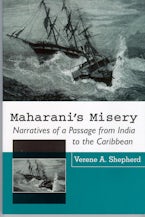Maharani’s Misery sheds new light on the ordeal of indentured Indians, especially women, as they crossed the oceans to labour on sugar plantations in the Caribbean (and elsewhere) in the nineteenth century. Narrating the tragedy of a young woman who died on one such passage, apparently after being raped by crewmen, the book analyses “sexploitation” as a routine aspect of the voyages of the “coolie ships”. The testimonies of those who gave evidence to the resulting enquiry in 1885 are included verbatim, an attempt to recover the voices of some of the indentureds, men and women, voices we rarely hear in the official documentation. This book is a valuable addition to the growing literature on nineteenth-century indentured Indian immigration/emigration and a gripping account of one woman’s tragedy. - Professor Bridget Brereton, University of the West Indies, St Augustine, Trinidad
Maharani is a most significant contribution to the new generation of scholarship on the history of Indian indentured migration, deeply researched and sensitive to the new approaches of intellectual enquiry. The author’s ability to read the contemporary texts against the grain of official pronouncements and popular prejudice against women in particular and indentured labourers generally, is truly impressive. I have no doubt that this book will find a place on the shelves of every serious scholar of the subject. - Professor Brij Lal, Australian National University, Canberra Maharani’s Misery is a major contribution to the “peopling” of Indo-Caribbean history in the late nineteenth century…. It enables us to go beyond the inanimate history which speaks primarily of the power of the indentureship system, the process of controlling the “bound coolies”. Here, the “subaltern” has a voice even in the midst of the tragedy one gets a feel for the women as actors, however minor. The work belongs, also, to the history of resistance in the region.
-Dr Clem Seecharan, University of North London

